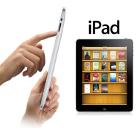The tout menace is a big problem in many Chinese cities, with the speculation by scalpers causing an increase in the prices of products in China.
THE iPad2 frenzy has gripped Beijing, so much so that a freak incident involving four visitors to an Apple Store at the trendy Sanlitun Village shopping complex in the Chinese capital puts its retail boom in a different light.
Last Saturday, two men and two women suffered injuries in a scuffle with a foreign worker of the Apple Store.
Mad, mad rush: Two injured teenagers being attended to in the aftermath of a scuffle at Apple?s Sanlitun retail store in Beijing on Saturday. ? APThe foreigner came out of the store and bashed a man with a stick for allegedly jumping queue as scores of shoppers lined up to buy the newly-released gadget.
According to news reports, the man was thrown against the corner of an outside wall. The man?s mother and aunt as well as another man who confronted the foreigner also suffered some minor injuries during the fracas.
Eye-witnesses said the glass door of the store was smashed as several members of the crowd surged forward to stop security guards from closing the store.
?He (the foreign worker) is about 1.9m tall,? Beijing Times quoted the man as saying. ?He was saying something, but I do not understand English and ignored him. He grabbed me by the collar and hit me.?
Chaoyang district police said the foreigner was maintaining order as some visitors had jumped queue and there were also several touts in the crowd.
Following the incident, the foreigner and injured parties resolved the case for a compensation of 20,000 yuan (RM9,200), the police said. However, police could not confirm the identity of the man involved in the fracas with the foreign worker.
Whether the man was a scalper or a shopper, there is no denying that the tout menace is a big problem in many Chinese cities.
At the theatre, touts would harass those outside the venue. At any sports event or exhibition, too, they would offer to buy a ticket or even accreditation.
A week after the incident, scalpers were still outside Apple Stores in Sanlitun Village and Xidan offering iPad merchandise to visitors to the stores.
?Add 200 yuan (RM92) more to buy iPad2; each 16G iPad2 costs 3,880 yuan (RM1,784),? one scalper said. ?Two days later when there is a shortage, it will be more expensive.?
Graphic designer Lin Zihan, who plans to buy an iPad2 online, said there was too much speculative buying and selling in China.
The scalpers would usually sweep all the legally imported goods and sell them at a higher price.
However, Lin said that consumers could buy online for less iPad2 that had been smuggled into China from Hong Kong, the United States and other countries.
He added that speculation by scalpers had caused an increase in the prices of the product in China.
?The same thing happened when sales of iPhone4 started in China,? he noted. ?I would rather wait a bit longer to buy an iPad2 than give the touts the chance to make money.
?I really hate the touts. If you do not crack down on them, they will not only speculate on trivial consumer goods but they might also move on to bigger things, and that could be harmful to the nation.?
The Apple Stores have posted signboards warning scalpers that action would be taken against them if they were found selling products at higher prices. The Apple management advised consumers to buy the goods at authorised outlets, and not from scalpers.
Prior to its launch last Friday, Apple Stores in Beijing had limited sales to two iPad2 per customer. But the ruling was subsequently recinded as sales assistants at the stores said consumers could buy as many as they wanted. Industry experts said that the move would result in more goods ending up in the hands of scalpers.
There have been supply shortages of iPad1 and iPhone before when the scalpers took advantage of the situation. Consumers had nowhere to go but the scalpers.
Unless Apple can ensure adequate supply of iPad2, the scalpers will always have a market.
The first Apple Store opened in Sanlitun Village in 2008, and the American company had since added three more stores in Xidan and Shanghai?s Huaihai Road and Pudong.
According to statistics provided by Apple, sales of its products in China raked in about US$5bil (RM14.7bil) in the past six months, of which an estimated US$450mil (RM2.25bil) was from the Sanlitun Village store.

No comments:
Post a Comment